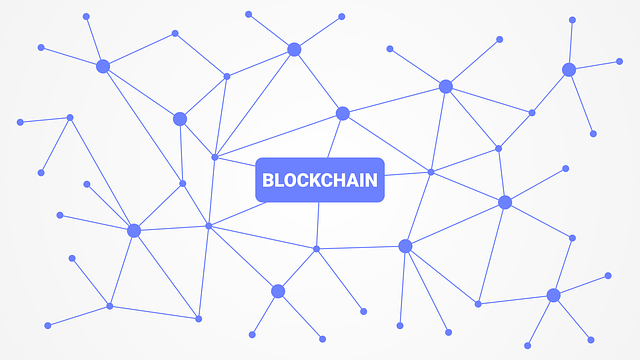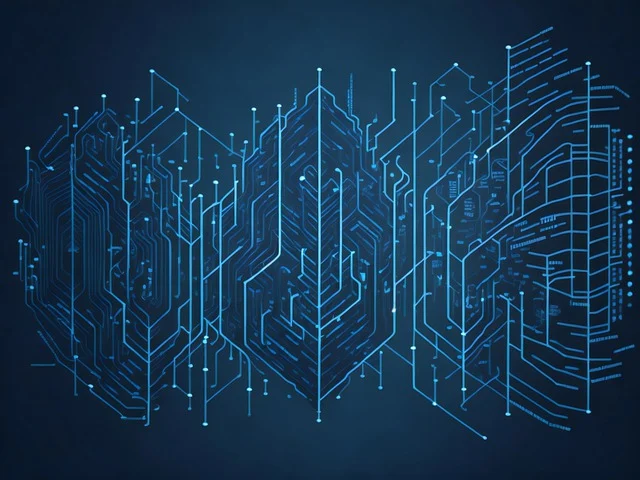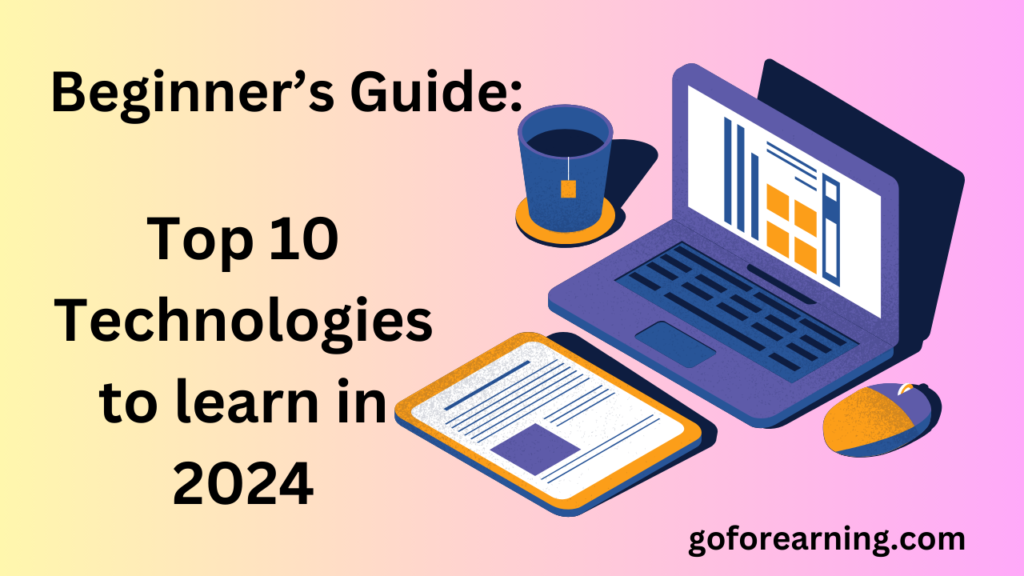Top 10 technologies to learn in 2024, picking out the exact technologies that will be most useful in 2024 can be hard because the tech world is always changing. But based on new tools and current trends, these ten things are expected to be important in 2024:
Artificial Intelligence and Machine Learning

Artificial intelligence (AI) is the study of making machines that can do things that normally require smart people to do. This includes processing normal words, fixing problems, and understanding what machines see and hear. AI is used in many areas, including healthcare (analysis and personalized treatment), finance (finding scams), and self-driving cars.
As a branch of AI, machine learning (ML) is the study of how computers can learn from data. A lot of ML models are supervised learning, unsupervised learning, and reinforcement learning. ML is what makes picture recognition, prediction analytics, and systems that make suggestions work.
Blockchain and Cryptocurrency

Blockchain is an independent and distributed ledger system that keeps track of activities safely and makes sure they are correct. Blockchain is used for more than just cryptocurrency. It’s also used for smart contracts, data sharing, and making the supply chain more open.
Cryptocurrency is a word for digital or virtual money that is encrypted to keep it safe. Some well-known ones are Bitcoin and Ethereum. In this area, it’s very important to understand how blockchains work and how they are developed.
Edge Computing
Edge computing: Instead of using a central cloud computer to process data, data is processed close to where it is created. This cuts down on delay and boosts efficiency, making it perfect for real-time processing-based apps like IoT.
5G Technology
5G is the fifth version of wireless technology. It has faster speeds, less delay, and more connections. It makes improvements possible in the Internet of Things, virtual reality, and high-performance apps.
Cybersecurity
Cybersecurity is the process of keeping computers, networks, and programs safe from threats. Cybersecurity experts protect data, stop people from getting in without permission, and come up with ways to fight online dangers.
Augmented Reality (AR) and Virtual Reality (VR)
Augmented reality, or AR, adds digital information to the real world, which changes the way a person sees it. Games, schools, and stores are all examples of applications.
Virtual reality (VR): VR puts people in a completely virtual world. It can be used in games, training exercises, and healthcare to help with evaluation and treatment.
Quantum Computing

Quantum Computing: This technology uses the ideas behind quantum physics to do calculations much faster than regular computers can. Quantum computers might be able to solve hard problems like security problems and planning problems.
Internet of Things (IoT)
Internet of Things (IoT): IoT lets systems and gadgets connect to the internet so they can share and collect data. Smart houses, factory systems, and healthcare tracking all use it. IoT workers need to know how to connect devices, analyze data, and keep things safe.
Robotic Process Automation (RPA)
Robotic Process Automation, or RPA, uses software bots to do repeated jobs that are based on rules. It makes business processes easier to follow, cuts down on mistakes, and boosts productivity. RPA is used in HR, customer service, and banking.
Natural Language Processing (NLP)

For more information on how computers and people talk to each other, see Natural Language Processing (NLP). It lets computers read, understand, and write text that sounds like it was written by a person. Conversational AI, language translation services, and figuring out how people feel about something (sentiment analysis) all use NLP.
To stay up-to-date in these areas, you need a mix of official schooling, real-world experience, and ongoing learning as technology changes. To be successful in the tech business, you need to be able to change and use these tools in real life.
FAQs:
Q: Why is Artificial Intelligence and Machine Learning important to learn in 2024?
A: Artificial Intelligence (AI) and Machine Learning (ML) are driving advancements across various industries, from healthcare to finance. Learning these technologies is essential for developing intelligent systems, making data-driven decisions, and staying competitive in the evolving job market.
Q: What are the practical applications of Blockchain and Cryptocurrency beyond just digital currencies?
A: Blockchain extends beyond cryptocurrencies, finding applications in supply chain management, secure data sharing, and smart contracts. Understanding these applications is crucial for professionals looking to leverage blockchain technology in diverse industries.
Q: How does Edge Computing differ from traditional cloud computing, and why is it significant?
A: Edge Computing processes data closer to the source, reducing latency and improving efficiency compared to traditional cloud computing. This is particularly important for real-time applications, such as Internet of Things (IoT) devices, autonomous vehicles, and industrial automation.
Q: What impact will 5G technology have on various industries, and why is it a technology to learn in 2024?
A: 5G technology provides faster speeds, lower latency, and increased connectivity, enabling advancements in IoT, augmented reality, and high-performance applications. Learning 5G technology is essential for professionals aiming to harness its transformative potential.
Q: How can one pursue a career in Cybersecurity, and why is it crucial to learn about it in 2024?
A: Pursuing a career in cybersecurity involves gaining skills in threat detection, prevention, and ethical hacking. With the increasing number of cyber threats, cybersecurity professionals are in high demand to secure systems and data, making it a crucial field to learn in 2024.
Q: What are the practical applications of Augmented Reality (AR) and Virtual Reality (VR) in different industries?
A: AR enhances the real world with digital information, finding applications in gaming, education, and retail. VR immerses users in virtual environments, used in gaming, training simulations, and healthcare. Learning AR and VR is valuable for creating immersive experiences across various sectors.
Q: How does Quantum Computing work, and what potential applications does it have in 2024?
A: Quantum Computing leverages quantum mechanics to perform computations at speeds impossible for classical computers. While still in early stages, it has potential applications in solving complex problems like cryptography challenges and optimization tasks.
Q: In what ways is the Internet of Things (IoT) transforming industries, and why is it important to learn about IoT in 2024?
A: IoT connects devices to the internet, enabling data collection and exchange. Its transformative impact includes smart homes, industrial automation, and healthcare monitoring. Learning about IoT is crucial for professionals seeking to harness its potential in diverse industries.
Q: How does Robotic Process Automation (RPA) improve business processes, and why is it relevant in 2024?
A: RPA automates repetitive tasks using software bots, streamlining business processes, reducing errors, and increasing efficiency. In 2024, RPA is relevant for professionals aiming to enhance productivity and automation in various business domains.
Q: What role does Natural Language Processing (NLP) play in technology, and how can it be applied in different sectors?
A: NLP focuses on the interaction between computers and human language. Message bots, language translation, and mood analysis all use it. Learning NLP is valuable for professionals seeking to develop applications that understand and generate human-like text, enhancing user experiences.





